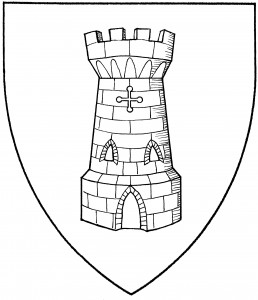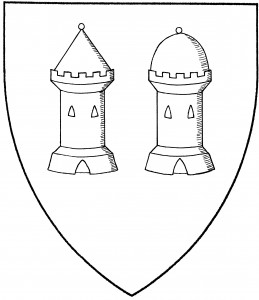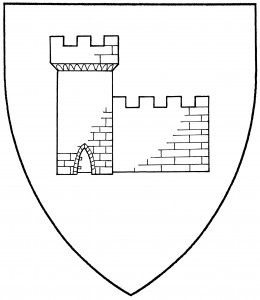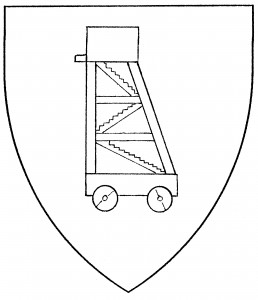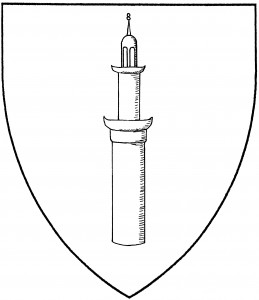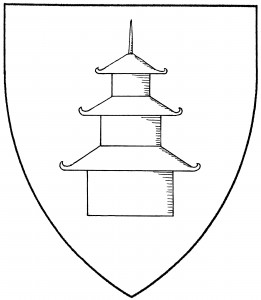A tower is a fortified edifice, roughly cylindrical with an embattled top; the door faces the viewer by default. The tower is frequently depicted with a cruciform arrow-slit facing the viewer; this is frequently left unblazoned. When blazoned “proper”, the tower is grey (i.e., argent), the color of stone. The tower is often drawn masoned, even when not explicitly blazoned so.
The top of the tower is subject to variation. A “tower triple-towered” has three tiny towers issuant from its top, as in the arms of Amcotte or Amcots, c.1550 [BSB Cod.Icon 291:94]. A tower may be “spired”, with a conical roof, as in the arms of Harta or Harsdorf, mid-16th C. [BSB Cod.Icon 308:372]. Or it may be “domed”, hemispherically by default, as in the arms of Burnsen, 1562 [BSB Cod.Icon 265:122]; the Society has examples of “onion-domed” towers as well.
A tower may be conjoined to a wall extending to sinister, as in the arms of Tour de Vinay, c.1370 [Gelre 50]. It may be “ruined” or “ruinous”, with the foundation intact but the top crumbled away. A “tower enflamed” has flames issuant from the top, and often the windows as well.
Finally, there are the tower variants unique to the Society: The “pagoda” is an Buddhist temple building with characteristic eaves. The “minaret”, associated with mosques, is a spire with a balcony near the top, where the muezzin may call the Faithful to prayer. The “siege tower”, or “belfroi”, is a wheeled siege engine which permits attackers to climb into a castle while safe from the defenders; it faces dexter by default, and its “proper” coloration is wooden brown.
Period heralds drew no distinction between the tower and the castle, treating them interchangeably; the exact blazon was often chosen solely for a cant, as with the arms of Towers, c.1310 (bearing what we would deem “castles” though the cant makes them towers) [ANA2 169]. Society heraldry distinguishes the castle from the tower for the sake of the artist, but grants no heraldic difference. For related charges, see lighthouse. See also bridge, wall.
The Baron of the Lonely Tower bears: Quarterly sable and gules, in pale a tower and a laurel wreath argent.
The Shire of the Isles bears: Barry wavy argent and azure, a tower within a laurel wreath gules.
Ann of the White Tower bears: Sable, a tower argent.
William of Hoghton bears: Per bend sinister sable and Or, in bend two towers counterchanged.
Adrian Buchanon bears: Per pale wavy azure and gules, a pale wavy between a tower argent, portalled to sinister, and a wooden siege tower proper.
Margherita di San Gimignano bears: Per bend argent and azure, a conical tower erminois.
Alysandra the Whyte Moor bears: Per bend sinister vert and argent, an onion-domed tower Or and a dragon’s head couped at the shoulder gules.
Joella of Blue Lion’s Keep bears: Per fess argent and azure, a lion passant and a tower conjoined to sinister with a wall, all within a bordure counterchanged.
Ito Nori bears: Per fess Or and sable, three flames and a pagoda counterchanged.
Yolanda del Campo de Cerdana bears as a badge: Counter-ermine, in fess a minaret and a dome conjoined at their bases argent illumined Or.
